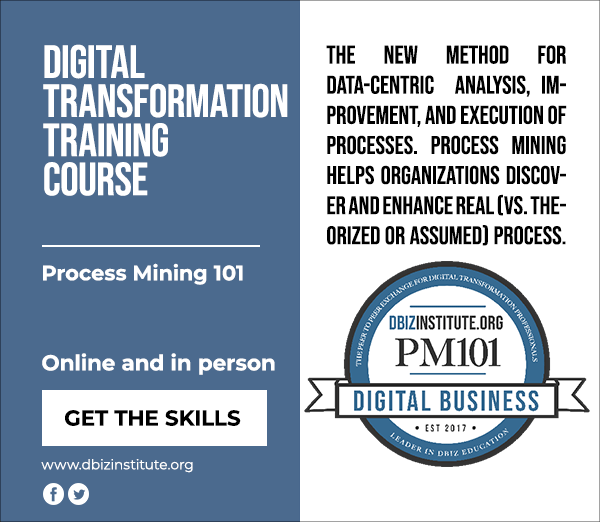Process Mining 101 – Face-to-Face
$1,195.00
Learn Process Mining – the new method for data-centric analysis, improvement, and execution of processes. Process Mining helps organizations discover and enhance real (vs. theorized or assumed) processes – with all its variants.
| Course Date | Standard Rate | Buy Before | Your Rate | Savings |
|---|---|---|---|---|
| Nov 17 '25 | $1,195.00 | Sep 18 | $895.00 | -$300.00 |
- Learn the relatively new Process improvement discipline: through discovering real process maps from event logs
- Understand the three major types of process mining: Discovery, Conformance, and Enhancement
- Learn how to prepare and aggregate data from systems of record (ERPs, legacies, databases) to generate Event Logs
- Learn the robust data-driven approach for Process optimization
- Learn how to identify opportunities for Robotic Process Automation and intelligent BPM solutions
- Learn how to enhance Real-Time Lean Six Sigma with Process Mining techniques
The course will provide the understanding and practice of the three types of Process Mining: Discovery, Compliance, and Enhancement. The course will explain the whole cycle with examples and best practices from digital footprints of applications to aggregations for even logs, to process mining insight and then actions with RPA and iBPM.
- VP of Process and Data Science
- Data Engineers
- Data Scientists
- Process Improcement Specialists
- AI Specialists
- Chief Executive Officer and/or President
- Chief Innovation Officer (the transformed CIO!)
- Chief Operations Officer (COO – or equivalent)
- Chief Human Resources Manager
- Chief Technology Officer
- Chief Digital Transformation Officer
- Chief Marketing Officer
- VP of Development
- VP of Product Management
- Operational Excellence Business Leaders: Lean Six Sigma Black Belts
- VP of Professional Services
- VP of Enterprise Architecture
















